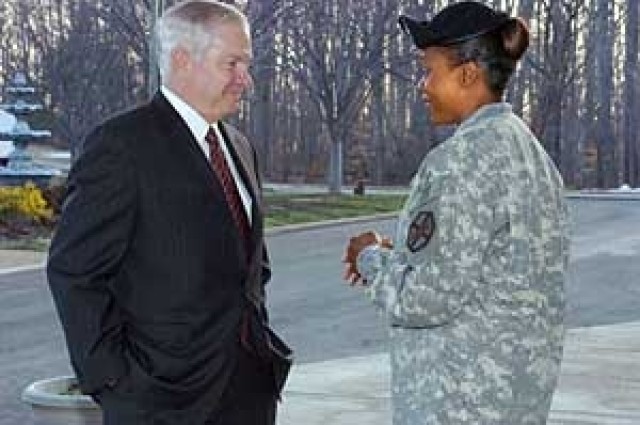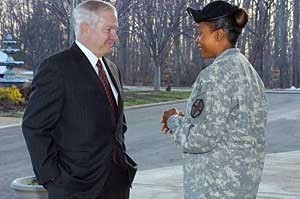Defense Secretary Robert M. Gates told Soldiers that he would hold accountable those responsible for outpatient conditions at Walter Reed Army Medical Center when he spoke at an Enlisted Breakfast at Fort Belvoir's Community Club on March 1.
The day before he accepted the resignation of Army Secretary Frances Harvey, Gates told those at the gathering that he was very concerned about reports of substandard conditions at Walter Reed.
"Being in the military has been likened to being in a family," he said. "And, it appears to me that some of our family hasn't been treated as well as they should have been ... [Wounded service members have] given their all for the nation. They deserve the best the nation can give them."
Published reports last month highlighted shortcomings in outpatient care that troops injured in Iraq and Afghanistan receive at Walter Reed. Gates said an independent review group he announced on Feb. 28 would work to ensure that Walter Reed and other similar facilities would provide the best possible medical care to those who sustain injuries while serving the nation.
"Let me be very clear about one other thing," he continued. "Any individual, regardless of rank - officer or enlisted, military or civilian - will be held accountable for that unacceptable situation. I will not allow only junior officer or enlisted to bear the heat, so stay tuned."
Gates said he recently had the opportunity to visit with troops serving on the front lines in Afghanistan and Iraq.
"Morale among the troops both in Iraq and Afghanistan is high," he said. "They are focused on their mission and they're proud to be serving during this moment in history. I think everyone comes away impressed by the sheer determination and professionalism of those serving today."
Gates said there is also no escaping the debate that is currently taking place in Congress about the war in Iraq
"President Bush, [Chairman of the Joint Chiefs of Staff] Gen. [Peter] Pace, along with millions of Americans and, I would say, the entire Congress of the United States, are determined to secure the equipment, supplies and support you need to complete your mission so the nation will remain a force for good in the world for generations to come," he said.
Responding to a question from an audience member later in the meeting, Gates said that there would probably be some number of detainees housed at Guantanamo Bay, "probably for a long time in the future."
"I'd like to shut the damn thing down tomorrow," he said of the detainee center. "Though I admire the service of those working down there, the reality is that it has become a blight on the United States both here at home and abroad."
Gates said there are several hundred detainees at Guantanamo who "are not going to go on trial and who will probably never be released because we know by their confession that they are dedicated, determined terrorists. We can't get anybody else to take them, including their own home countries. In some cases, we don't want anybody else to take them because they'll let them go."
He added that he hopes to continue to reduce the number of detainees being held at the facility.
"My hope is that we can get it down to 200 or 300 hardcore, but I think we'll be stuck with those people for the indefinite future," remarked Gates.
He also noted that this year's Defense Department budget request continues to focus on improving the standard of living of service members and includes nearly $3 billion to continue to improve enlisted barracks and housing, Gates said.
"This year the department is building more child development centers and schools so we can continue to take care of our families as well as our troops," he said.
He said the Fiscal Year 2008 budget also allocates $177 billion for force modernization.
"We're talking about the next generation of fighters, we're talking about the next generation of tanks, the next generation of Navy ships. The budget contains money for the first carrier of a new class," he said. "We are looking to the future."
Gates noted that over the past 90 years the United States has demobilized and slashed military and intelligence spending five times - after the two World Wars, Korea, Vietnam and the Cold War - always in the belief that "somehow the basic nature of mankind had changed, or despots had departed this world. No matter how much we want to negotiate solutions to our problems, the reality is there are folks in the world like these radical jihadists who understand only one thing, and that's power."
Gates also plans a quarterly lunch with senior enlisted personnel as another way to keep in touch with service members.
"Your job is very difficult," he said. "You spend many long hours at work. There's a natural pull, I'm sure, for each of you to be out shoulder to shoulder with those standing watch on ships or at forward operating bases as many of you have been these last few years. Though you may be working thousands of miles away, your impact and your positive leadership is felt in every fighting hole and on every front line."
Those attending the session, like Master Sgt. Carolyn Wilson of the installation's Equal
Opportunity Office and Sgt. 1st Class Connie Courtenay of Human Resources Command, said they enjoyed Gates' down-to-earth discussion.
"For the first time in my life, I really enjoyed listening to a presentation," said Wilson.
"It didn't get too technical," added Courtenay.
And Gates did not forget the sacrifices that those who he spoke to make every day.
"It's truly been an honor to be called back into service as secretary of defense, to serve our country, to serve with men and women like you at this time of great consequence," he said. "I want to thank each and every one of you for what you do each day."


Social Sharing